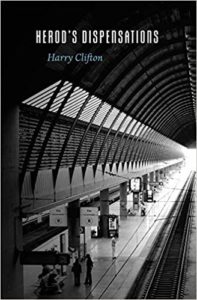Herod the Great (74/73 B.C. to circa 4 B.C.) lived 2,000 years ago, but he still causes arguments among historians. He built the second temple in Jerusalem, the port at Caesarea, fortresses, and palaces. He reorganized Judea’s social hierarchy. He rather artfully managed his Roman overlords.
Yet he was among the most violent and ruthless of kings, including within his own family. He’s most infamously associated with the slaughter of the innocents, the killing of the young children and babies to eliminate the king foretold to take his place. Some scholars doubt that story, recorded in the Gospel of St. Matthew, but Herod certainly had the reputation to be credibly accused of it.
Irish poet Harry Clifton uses the idea of Herod in his latest poetry collection, Herod’s Dispensations. A dispensation is a system, a general ordering of things, as in an ordering of human affairs. Herod was certainly associated with an ordering of society, and for a very long time. While that ordering brought construction and political stability, it also brought violence and destruction. Clifton considers Herod and his ordering, and then considers the world we know today.
Things may not have changed all that much. The 34 poems of the collection don’t tell a single story as much as a number of stories. Clifton ranges over geography and history and topography to the point that you have to pay close attention to realize he’s talking about different places and times. This is the time of Herod, and it’s the time of Mao. It’s Judea, China, the Philippines, California, and Ireland. Herod’s dispensations can be found across landscapes and across history.
There is no title poem, but there is a poem that includes the name of the title. It’s ostensibly about a familiar story from the gospel of Matthew, of Joseph and Mary fleeing to Egypt as Herod’s decreed slaughter of the babies unfolds. Clifton, however, tells the story in a very contemporary way, and punches home the point in the last few lines.
A Flight into Egypt

Cities without bridges to be burned,
Uncertain roofs—protecting ourselves, a couple
Gone into hiding, who would one day return
When the balance of power changed, and the attitudes.
Meanwhile, strangers were kind. The terrible places,
Unexpectedly, were generous with food,
Indifferent for the most part, sometimes even gracious.
And to this day, our books on the shelf,
Our suitcases unpacked, I ask myself,
If it might ever happen again—
Protection of innocence, Herod’s dispensations,
Transit lounges, midnight railway stations—
No, not even whether, only when.

Harry Clifton
We live in an ordered society, but we come to realize that we live in a time when violence may be just around the corner. Refugees know this story well. The people of Syria and Iraq know this story well. And while the poet never directly addresses the global refugee problem, you sense that this, too, is part of Herod’s dispensations.
Clifton has published several poetry collections, including The Liberal Cage, The Desert Route, At the Grave of Silone, Secular Eden: Paris Notebooks 1994-2004, Portobello Sonnets, The Holding Centre, The Winter Sleep of Captain Lemass, and Comparative Lives. He’s also the author of a fiction collection, Berkeley’s Telephone and Other Fictions, and the prose work On the Spine of Italy: A Year in the Abruzzi. He’s lived in Europe, Africa, and Asia, and served as an aid administrator in Thailand from 1980 to 1988. He’s also been an International Fellow at the University of Iowa and poet-in-residence at the Frost Place in New Hampshire. He currently teaches at University College in Dublin.
Herod’s Dispensations is a collection of poetry that speaks to contemporary times without becoming political or polemical. These poems represent a statement of fact rather than of feeling or belief system. And they speak powerfully.
Photo by Sharada Prasad, Creative Commons, via Flickr. Post by Glynn Young.
__________________________

“I require all our incoming poetry students—in the MFA I direct—to buy and read this book.”
—Jeanetta Calhoun Mish
- Longfellow’s “Paul Revere’s Ride”: Creating a National Legend - April 17, 2025
- Poets and Poems: Katie Kalisz and “Flu Season” - April 15, 2025
- Poets and Poems: Michelle Ortega and “When You Ask Me, Why Paris?” - April 10, 2025

Maureen says
We are all, in our varied ways, refugees, seeking shelter from the thing(s) we can’t name. Clifton evokes so well, and simultaneously, not only the past but the current state of the world. While reading the poem you’ve shared here, I couldn’t help but think not only of the Middle East and African refugees but also the Holocaust, Palestinians, African Americans, and the many prospective asylum-seekers from Central and South America who tomorrow may be swept up in the “round up” in the news this morning. This poem is as much about our United States as about anywhere. And it’s haunting.
L.L. Barkat says
Sounds like a powerful collection indeed. What a great (though terrible) way to get at a subject poetically, across time and place.